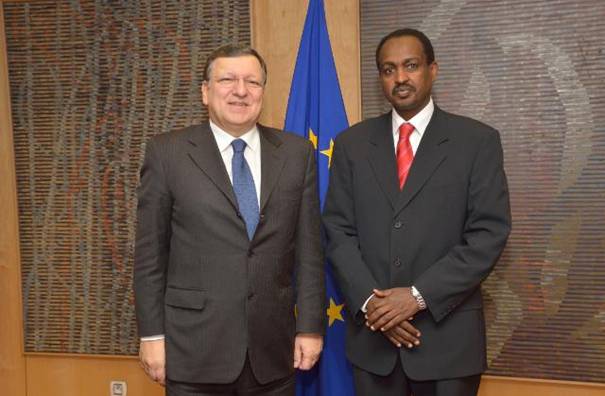Addis Ababa, 17 April 2014 (WIC) -The European Union (EU) yesterday announced a €40.2 million grant to the Ministry of Health and UNICEF through the “Enhancing Skilled Delivery in Ethiopia (ESDE)” project.
This new funding from the EU will be used to scale-up maternal health and new-born care for a three year period (2014-2016). Of this grant, €20 million is allocated to the MDG Pool Fund of the Federal Ministry of Health (FMoH) and the remaining half to UNICEF.
This new maternal health initiative between the EU, Ministry of Health and UNICEF represents one of the largest grants to maternal health ever provided to Ethiopia.
Aimed at scaling up services to mothers and new-borns, the ESDE project will be implemented jointly by the Ministry of Health and UNICEF, with the support of other development partners and health professional societies working in the area of maternal and new-born health.
At the project launch, Dr Kesetebirhan Admassu, Minister of Health said, “The government of Ethiopia is rapidly expanding access to basic health services to communities to prevent maternal and new-born deaths. With the strong commitment of our government and the sustained support of all our partners such as the EU and UNICEF, we can speed up the reduction of maternal and new-born deaths even further.”
The ESDE project is expected to benefit 625,000 mothers and new-borns annually from improved access to maternal and new-born health services – a quarter of annual national deliveries. In the three year implementation period, the project will support close to 2 million mothers and new- borns.
The joint initiative aims to strengthen maternal and new-born health in Ethiopia by supporting the health system to achieve national targets and Goals of MDG 5 by increasing access to and utilization of quality maternal and new-born health services for mothers and new-borns in the coming three years.
While MDG 4 (reduction of child mortality) has already been attained three years ahead of time, MDG 5 (improvement of maternal health) remains the only health related MDG goal that is not on track as we approach 2015.
According to the Ethiopia Demographic and Health Survey of 2011, Maternal Mortality Ratio (MMR) is 676 per 100,000 live births while the expected MDG 5 target is to reach the level of 267 per 100,000 live births by 2015.
Ambassador Chantal Hebberecht, Head of the European Union Delegation to Ethiopia, said, “While Ethiopia has made tremendous progress on most health indicators, improving maternal mortality rates remains a distinct challenge. I am therefore happy to announce that the European Union has made available a €40.2 million grant for Ethiopia to accelerate progress in maternal health by jointly working with the Ministry of Health and UNICEF.”
In Ethiopia, up to 15 per cent of mothers and new-borns suffer serious complications that require referral to facilities providing comprehensive emergency obstetric and neonatal care (CEmONC) services including caesarean sections, blood transfusions and emergency laparotomy. However, the availability of CEmONC has been limited with only over a hundred hospitals having the capacity to provide the service.
The 2011/2012 Health Management Information System (HMIS) report of the Ministry of Health states that only 20.4 per cent of women delivered in health facilities.
To increase access, the MoH has committed to the improvement of services based on the Health Sector Development Plan (HSDP) through the construction of over 800 new primary hospitals [one primary hospital per woreda (district)].
The construction of over 200 hospitals has already been initiated in the various regional states and is expected to be completed soon 2012/13 Annual Review Meeting (ARM) Report, MOH.
The hospitals need to be equipped with basic supplies and equipment to provide maternal and neonatal care including equipment for basic operation facilities and essential neonatal care equipment.
In order to sustain gains made so far and to scale up the provision of health services, the ESDE project will provide:
•obstetric and new-born care supplies and equipment for 500 health centres and 50 hospitals
• operation theatre equipment for 30 primary hospitals
• training for 5000 health extension workers in community based new-born sepsis management
•obstetric and new-born care training for 250 doctors and health officers from 100 hospitals
•emergency obstetric and new-born care training and supportive supervision for 1000 midwives and nurses
“We commend the European Union for such a critical and timely intervention and the Federal Ministry of Health for its focus on maternal and new-born health.
UNICEF is firmly committed to the successful implementation of the project prioritizing the hard to reach and vulnerable women and children,” said Dr Peter Salama, UNICEF Representative in Ethiopia. (Diretube)




